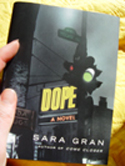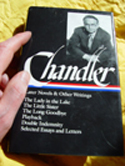The GoodShortNovels.com Review--One Recent Release and One Classic
1950s Detective Noir
DOPE and PLAYBACK
Reviewer: Stedman Mays
Recent Release
 DOPE by Sara Gran. Putnam, 2006 (the novel is set in New York City in 1950). Hardcover. 243 pages of text that is nicely laid out and easy on the eyes. Estimated length of the novel: around 60,000 words.
DOPE by Sara Gran. Putnam, 2006 (the novel is set in New York City in 1950). Hardcover. 243 pages of text that is nicely laid out and easy on the eyes. Estimated length of the novel: around 60,000 words.
I guess you could say she's a recovering addict who hasn't quite recovered. This makes her vulnerable and lends her characterization a humanity missing from a lot of the writing in the mystery genre, which tends toward cookie-cutter stereotypes. And Joey is a woman with even more skeletons in the closet. It's hinted at that she worked as a prostitute when she was younger and under the influence of drugs, drifting from one divey place to another in New York City. She's been through a difficult divorce from a guy who still hasn't broken his dope habit. And she's scarred from the neglect of an absent father and a no-good mother who left Joe and her younger half sister, Shelley, alone in their ratty Hell's Kitchen apartment to fend for themselves for days at a time. Joe and Shelley don't even know for sure who their fathers are, but they suspect from their contrasting features that their promiscuous mother conceived them with different men. Joe, being the older sibling, tried to take care of Shelley as best she could when they were growing up, making sacrifices so that the beautiful Shelley might have a better life and an opportunity to make something of herself. So Joe is happy that Shelley has managed to get work as a model and an actress and is living in a fancy doorman building.
But Joe is stuck renting a dingy furnished room, with a shared bathroom down the hall. Even though Joe has managed to kick the habit, she's remained part of the New York underworld, shoplifting for a living and selling stolen goods on the black market. And these underworld connections end up coming in handy. Two concerned parents offer Joe a thousand dollars--a considerable sum of money in the 1950s, the era in which the novel is set--to look for their missing daughter, an attractive young college student at Barnard who's taken up with a dangerous drug mobster and pimp, with whom the young girl has disappeared. Thus Joe Flannigan isn't a detective in the classic sense--it's not her full-time job. Rather, she's pressed into service as a detective because of her relationships with the shady characters of New York City. The parents have made her an offer she can't refuse, with the promise of an additional thousand dollars if Joe succeeds in locating their daughter.
DOPE, despite its title, is mostly about the search for the missing girl, but it is also about Joe's exploration of people from her own troubled past as she sifts through the city for clues. We meet the usual assortment of characters from New York's underbelly--madams, pushers, impostors, flophouse junkies, park-bench warmers, worn-out prostitutes, owners of bars for those with "alternative lifestyles," slick coppers, and the like. Even an outwardly respectable Westchester housewife in the suburbs is simmering with conflict beneath her veneer of tranquil perfection. These cameos were often fun to read, and I found myself looking forward to the next bit player that Joe would come across. Sara Gran, the author, evoked many of them with telling detail, filtered through Joe's perspective as the first-person narrator.
A couple of the lead supporting characters and an incident here and there were not as successfully rendered, however. For example, Joe gets angry at someone she suspects of sexually abusing the missing girl, so Joe throws a rock through a window of the alleged abuser's house to spite him. But the incident seems to be a trite shortcut for dealing with the alleged abuse and doesn't do justice to the emotional undercurrents of the novel. I wish Gran had explored this subject matter with an unflinching eye rather than coming up with a petty act that seemed out of character for Joe (and a waste of time when time was at a premium for Joe at that point in the story). Similarly, some of the emotional connections between Joe and the two characters who seem most intimately involved in the mystery puzzle needed more development, in order to make the twin climaxes late in the book more viscerally wrenching. The first of these violent clashes targets a character who is poorly delineated by the author. The second and final violent clash is more psychologically engaging, but it could have been magnificent if we had gotten to know the suddenly revealed "villain" a bit better earlier on.
But, all in all, DOPE is an entertaining ride through 1950s New York and a survey of the seedy, down-and-out, hard-luck-story types you love to visit in noir fiction, with a few well-to-do people and places thrown in for good measure. DOPE is the kind of book that would lend itself easily to film, and it has reportedly been bought by Paramount. Hollywood is always complaining about the lack of wonderful roles for women; Joe and her sister Shelley are characters that should appeal to serious actresses. The flaws in the narrative could be addressed and improvements could be made in a compelling film treatment. But whether or not a decent film version ever gets made, Sara Gran has given readers the gift of a detective novel that attempts to go to places in the heart that most other books in the category avoid.
For Sara Gran's website, click here
Classic Revisited

All late-starter novelists can take heart from the example of Raymond Chandler. He didn't publish his first novel, the marvelous BIG SLEEP, till 1939, after he had passed his fiftieth birthday. And for twenty years thereafter he created an important body of work in the detective novel genre, as well as being a collaborator on some of Hollywood's most memorable noir scripts.
PLAYBACK is the last novel that Raymond Chandler completed. It was published in 1958, in the year before his death at the age of seventy in 1959. And the book has suffered from neglect and generally negative assessments ever since.
Perhaps readers and critics alike have been uncomfortable with the winding-down feeling, the sense of petering out, that permeates the novel. Everything for the older, and more calmly bemused, Philip Marlowe seems to be a replay of something that came before. Marlowe doesn't say this explicitly, but it's implicit in the way he tells the story from his perspective as an aging man who's been there, done that. Marlowe settles back into his lodgings and sits on his couch, staring at "a blank wall in a meaningless room in a meaningless house."
PLAYBACK begins simply enough--Marlowe gets a call from a hotshot lawyer requesting him to shadow a good-looking and young redheaded woman who's on the run in southern California. The specific client for whom the lawyer is making the request is mysteriously undisclosed, so Marlowe doesn't know whom he would be working for. But the dick decides to take the job anyway. He follows her to "Esmeralda," a rich retirement community near San Diego. Marlowe promptly settles into a motel room next to hers where he takes out his trusty stethoscope to eavesdrop on her and a blackmailing gigolo through a heating vent in the adjoining wall.
But, with so little information and so much confusion, it's hard to know for sure whether she's being blackmailed or whether she's the one doing the blackmailing. The rest of the novel takes on the question as we journey through a series of strange disappearances and crossed lines of communication. Questions beget questions as each piece of the puzzle falls into place, or seems to fall into place.
As is the standard for all good noir fiction, PLAYBACK is no better than the quality of the characterizations and the vignettes and the dialogue, and in my opinion Chandler's grasp of people has never been firmer nor has his writing been livelier. There's also a socioeconomic awareness of the haves and have-nots that is extraordinary--of course Chandler delivers it without having to strike the reader over the head with a frying pan. The world of noir fiction always relies on certain stereotypical observations, especially noir books written long ago that feature a wisecracking PI, but sometimes in PLAYBACK we're presented with a stereotype that ends up being complicated or subverted or made more fully human. And PLAYBACK is Chandler's sexiest book, with broodingly erotic scenes and images that linger.
Grab it and don't let go till you're done. PLAYBACK is a gem that is in desperate need of reassessment.
I can only quibble over wanting more about the lead female figure. Her past is ultimately clarified and then we don't hear much from her. Her moral ambiguities are fascinating and I wanted a bit more, but perhaps Chandler's point is that there are ambivalences that we hesitate over without ever having absolutely conclusive answers.
For the current edition of the GoodShortNovels.com Review, click here
For the archive of past reviews, click here
Copyright 2006 Scribblers House® LLC New York. All rights reserved.